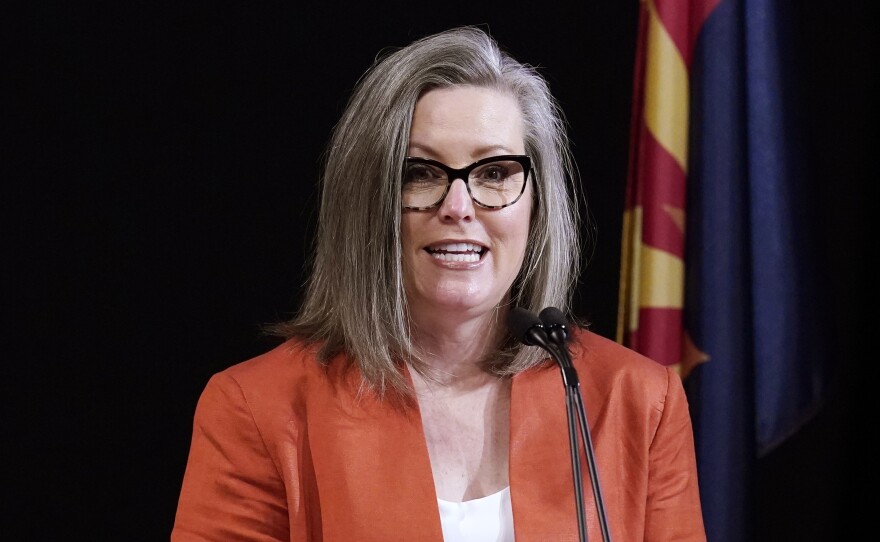Arizona Republicans have stripped the secretary of state's office — currently held by a Democrat — of the right to defend the state's election laws in court, or choose not to, a change enacted as part of Arizona's newly signed budget.
The spending blueprint that Gov. Doug Ducey signed into law Wednesday declares that the attorney general — currently a position occupied by Republican Mark Brnovich — has sole authority over election-related litigation.
If the secretary of state and attorney general were to disagree over a legal strategy when Arizona election laws are challenged, the new law states that "the authority of the attorney general to defend the law is paramount."
Republicans also adopted language stating it's their intent for the law to apply through Jan. 2, 2023, coinciding with the end of Democrat Katie Hobbs' term as secretary of state.
Hobbs, the top election official in Arizona who's now running for governor, says her lawyers are looking at whether this change violates the Arizona Constitution.
"This is a petty, partisan power grab that is absolutely retaliation towards my office," Hobbs said. "It's clear by the fact that it ends when my term ends. ... It is at best legally questionable, but at worst, likely unconstitutional."
Republicans have generally cast the law as a cost-saving measure, citing Hobbs and Brnovich's frequent disagreements over how to defend state election laws that have been challenged in court. In 2020, Hobbs filed complaints with the state bar against Brnovich and other lawyers in his office.
Other election provisions in the budget
The budget includes a number of other election provisions, and it comes weeks after Republicans enacted new restrictions on early voting in the state, and as a controversial review of 2020 election results in Maricopa County continues.
Here are some of the other election-related measures in the budget:
- New laws could soon require watermarks, QR codes and other security measures to be printed on ballots.
- There's a new mandate to inspect state and county voter registration databases and create a report on voters who cast federal-only ballots — an option available to Arizonans who don't show proof of citizenship to register to vote in the state, but are still allowed to register under federal law.
- And a new task force would investigate alleged social media bias as an unreported in-kind political contribution.
The ballot security measures, though not mandated by law in the budget, have the potential to be the most cumbersome and costly requirement for county election officials to implement.
The budget amendment provides a list of 10 "ballot fraud countermeasures" for counties to choose from — features like holographic foil, background designs similar to those found on banknotes and ultraviolet or infrared ink. If mandated, counties would have to implement any combination of at least three features from the list on their ballots. The budget provides $12 million to pay for those features, to be split among Arizona's 15 counties.
"By everyone's admission, there is only one company that can do any of this," said Jennifer Marson, executive director of the Arizona Association of Counties. "And so now, we can't have a competitive bid process or a traditional procurement process at the county or state level to use these countermeasures because we're locked into one company."
That company is Authentix, a Texas-based firm that provided Republican Rep. Mark Finchem with a sample ballot that included watermarks, QR codes and other security measures. Finchem had the sample ballot on display at the Capitol in March. According to the Yellow Sheet Report, it could be five times more expensive to print ballots with those security measures as it is to print paper ballots currently in use.
Marson said Finchem has acknowledged the security levels required of companies in the budget amendment could only be met by Authentix, and has vowed to mandate the ballot security measures in the "very near future."
Finchem defended the company in a brief email. He wrote that Authentix "offers these countermeasures to governments around the world for document and tax stamp security."
As the budget was being considered, Democrats like Sen. Tony Navarrete said the amendment is part of a broad effort to solidify conspiracy theories of election fraud.
"It's important for us to make sure we vote down conspiracy-laced amendments that are going to hurt the integrity of our election system in the state of Arizona and encourage other states to have these bad copycat laws spread like wildfire," he said.
Copyright 2021 KJZZ. To see more, visit KJZZ.






